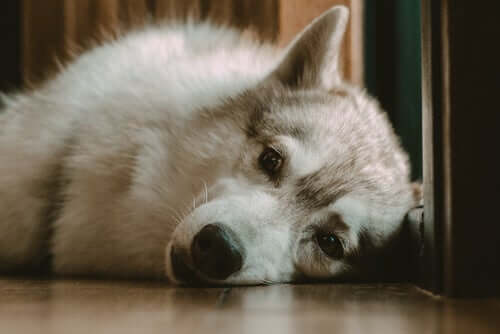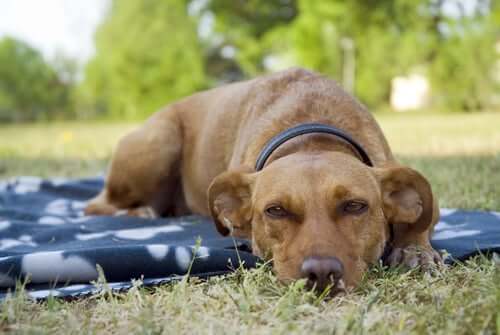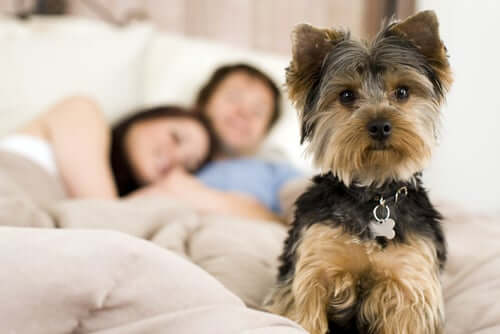What If My Dog Doesn't Sleep at Night?

Restlessness at night can affect animals as well as humans. Did you know that it’s quite a common problem for your dog not to be able to sleep at night? It may be because of insomnia or because it’s still a puppy. But, whatever the case, the issue is probably affecting your rest as well!
As with any kind of problem that your pet has, in order to be able to help it you first need to know what the root causes are.
Why your dog doesn’t sleep at night

Since the causes can be many and varied, in this article we don’t just want to list them, but we’ll also give you a few ideas for solutions to reduce or eliminate the cause of the problem altogether. Let’s look at some of the reasons why your dog doesn’t sleep at night:
Noise
This is a problem that also affects humans, so it shouldn’t surprise you. When the surrounding environment is too noisy, it would be normal for your dog not to be able to sleep at night. Whether it’s firecrackers, storms, or even noisy neighbors that won’t stop talking, these things can interrupt your dog’s sleep.
Health problems
If your dog is, all of a sudden, getting sleepless nights, it’s quite possible that it’s because something is hurting it or annoying it in somewhere on its body. This could sometimes be caused by oral diseases.
Take your dog to see the vet to be able to rule out the possibility that your dog’s insomnia is caused by a physical problem.
Temperature
Although the temperature of your house might seem pleasant to you, that doesn’t necessarily mean it’s the same for your dog. Check the area around your dog’s bed. How does your dog behave when it’s in its bed? You should be able to tell if it’s hot or cold, and move the bed if necessary.
Indigestion
If your dog has eaten too much or too late, it’s normal that it might not sleep too well that night. It would be best to spread out your dog’s meals throughout the day and avoid giving it much at night. Above all, don’t give it your food to eat. Why? A dog’s digestion is slower and won’t be able to deal with it that well.
Lack of exercise
If a dog doesn’t get enough exercise, it’s more likely to be nervous and restless and that means it’ll have trouble sleeping. Research how much exercise your dog should be getting for its age and breed. Then, do whatever you can to help it to sleep well at night.
What to do if your dog doesn’t sleep at night
Well, now that you know some of the causes of sleeplessness in dogs, you can do something about it. A dog should sleep around 13 hours a day, which includes around 9 hours that should be at night. If your dog doesn’t sleep that much then something’s wrong. Take a look at the following areas:
Location
As we mentioned above, temperature or other distractions could be robbing your dog of sleep. If you think that your pet isn’t comfortable enough sleeping in the place where its bed or basket is, then you might have to change the location.
Look for a quiet, peaceful spot with a pleasant temperature. Or you could make some adjustments where the bed is currently located.
Exercise
This is essential for your dog to be relaxed and stress-free. The exercise will also tire it out and the tiredness will help it to sleep through the night. In fact, for your dog to be able to get to sleep easily, exercise is vital. An exercised dog is a happy dog.
Dinner
Don’t give your dog too much to eat at night. If you can, it would be best for it not to eat anything at all at night. Trying to sleep with a full stomach isn’t good for anyone, including dogs.
Noise

What if you think, ‘but if the noise doesn’t bother me…’? Remember that dogs’ hearing is much more acute than humans. You should check the room where your dog sleeps. If you think that there might be annoying noises that are disturbing your pet’s sleep, look for a better place for its basket.
Routine
Dogs need a certain amount of routine in their life. This is because their instincts guide them at all times, and that means they know what comes next in their day. So, take your pet for a walk at the same time each day, and do the same with mealtime, playtime, or other routine tasks.
As you can see, there is a lot you can do to make sure your dog gets a good night’s sleep. Remember that, as with any problem your dog faces, it’s depending on you to fix it. Do everything in your power to help your friend!